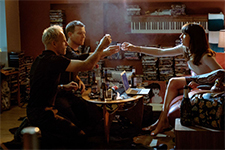T2 Trainspotting
|  Early in Danny Boyle’s breakthrough sophomore film Trainspotting (1996), one of the film’s heroin-addicted young characters, Sick Boy (Jonny Lee Miller), explains his “unifying theory of life” to Mark Renton (Ewan McGregor), the film’s lanky, conflicted protagonist: “At one point you’ve got it, and then you lose it,” Sick Boy says. “And it’s gone forever. All walks of life.” His theory, which is little more than an elaboration of The Who’s famous lyric “I hope I die before I get old” from “My Generation,” initially stems from a discussion of the career of Sick Boy’s favorite actor, Sean Connery, but he quickly expands his argument to include the “downward trajectory” of numerous musicians and actors, including David Bowie, Lou Reed, David Niven, and Elvis Presley. “So, we all get old, we can’t hack it anymore, and that’s it,” Renton summarizes incredulously. “That’s your theory?,” to which Sick Boy blithely replies, “Yeah.” I couldn’t help but think of this scene while watching Trainspotting’s awkwardly titled, late-in-coming sequel T2 Trainspotting, which finds Renton, Sick Boy, and several of their mates muddling through middle age 20 years later. The depiction of the characters in the sequel is, in a way, a verification of Sick Boy’s theory about life being a downward trajectory—“beautifully illustrated,” as he puts it in Trainspotting—although it is hard to argue that any of the characters were anywhere other than bottom two decades earlier. The same cannot, of course, be said for those who made the film. Trainspotting was a major international arthouse hit that secured the careers of director Danny Boyle and star Ewan McGregor, who had previously worked together on Boyle’s feature debut Shallow Grave (1994), which was also the debut of screenwriter John Hodge and produced by Andrew Macdonald, all of whom return for T2. Since then, Boyle has directed numerous commercially and critically acclaimed films, including the multi-Oscar-winning Slumdog Millionaire (2008). Hodge has likewise remained active, penning several of Boyle’s subsequent films, as has Macdonald, who recently produced Alex Garland’s Ex Machina (2014) and his forthcoming Annihilation. McGregor has gone on to be a major star, successfully alternating between big-budget studio work (notably George Lucas’s Star Wars prequels) and indies, and the rest of the cast has stayed consistently busy, as well. As you may recall, Trainspotting ended with Renton stealing £16,000 from his ostensible friends Sick Boy, Spud (Ewen Bremner), and Begbie (Robert Carlyle), with whom he had just made a major heroin deal. The film literally ended with him walking directly into the camera, a big grin on his face, the money bag slung over his should, as he told us in voice-over narration that he was planning on changing from being a “bad person”—he was “going straight and choosing life.” The irony, of course, is that his personal make-over came at the expense of his ostensible friends and was founded on the theft of drug money, but no matter. It was exactly that kind of moral complexity and irony that made Trainspotting such an intense, vigorous, illuminating cinematic experience. T2 picks up two decades later, where we find that Renton has in many ways made good on that promise. He has stayed clean, gotten married, and forged a relatively innocuous, productive life in Amsterdam. He returns to his native Edinburgh for reasons that are not immediately clear, and he is soon reunited with his old mates with whom he has had no contact since he stole their money and walked out on them 20 years earlier. Spud, the awkward, constantly befuddled goofball of the bunch, is in the worst state: still addicted to heroin and legally forced to stay away from his girlfriend and daughter, he is in the throes a suicide attempt when Renton comes to see him. Renton next sees Sick Boy, who is now going by his given name Simon, although he is still leading a sick life: Now addicted to cocaine, he runs his deceased aunt’s pub as a front for a blackmail scheme in which he uses his girlfriend Veronika (Anjela Nedyalkova) to trap wealthy men in compromising sexual positions on video. Simon is still seething about Renton’s betrayal 20 years earlier, but they eventually mend their relationship, and Simon attempts to bring Renton in on a new scheme to build a brothel above the pub. Much, much less forgiving is Begbie, who has spent the past two decades in prison and has just broken out with a plan to reignite a life of burglary when he discovers that Renton is back in town. A violent psychopath who actively seeks out conflict, there is little question that Begbie wants to do anything less than kill Renton for his youthful transgression. Although there are constant echoes of Trainspotting all throughout T2—visual counterpoints to and direct flashbacks of scenes from the previous film, musical refrains, lines of dialogue, familiar locations, and the appearance of characters such as Diane (Kelly Macdonald) who serve little purpose other than nostalgia—it is a very different film in many ways, which some will find disappointing and others will find creatively daring. The first thing viewers will probably notice is the almost complete lack of voice-over narration. One of the things that maintained Trainspotting’s propulsive forward motion and held it together was Renton’s voice-over, which commented on the action with vigor, humor, and wry, brutal honesty. That is entirely missing from T2 except for one scene in which he must explain some British history to help us make sense of a scene in which Renton and Simon rob a bar full of anti-Catholic nationalists (unfortunately, this one bit of narration feels incredibly lazy because it is so one-dimensionally informative). There is a scene midway through the film where Renton recreates the famous “Choose …” monologue from the beginning of Trainspotting updated for the Facebook/Twitter generation, but it is delivered directly to another character. T2 is also a much more convention film in terms of narrative, following a direct linear progression that is quite opposed to Trainspotting’s more episodic approach (part of this is probably due to source material, as Irvine Welson’s Trainspotting novel was like a bunch of short stories bundled together, whereas his sequel, Porno, on which Hodge partially based his screenplay, is a more traditional linear narrative). In that regard, T2 is a much more conventional film, and it doesn’t really pop like its predecessor. What remains the same is Boyle’s high-energy visual style, which is even more enhanced given the shift to digital and all that entails. T2 is very much in keeping with Trainspotting’s visual and aural energy, although the age of the characters and the desperation they face at mid-life gives the film a more fraught quality. They have each aged differently, with Spud and Simon looking more gaunt, while Renton’s face is actually fuller (he looked particularly thin and strung-out in Trainspotting) and Begbie looks thick, as if he has been coating himself in layers of his own anger. Their combined receding hairlines and lined faces are testament to the passage of time, while their stressed lives and desperate actions suggest that they have learned little over the passing years. Spud is still a misguided soul looking in all the wrong places; Simon is still enthralled with using his innate gifts for all the wrong reasons; and Begbie is still a vile bully used to getting his way through intimidation and fisticuffs. Renton is the only one who has progressed in life, although as we soon learn, he does not have things nearly as well in hand as it first appears, which is why he’s subject to Simon’s new scheme. Seeing these characters 20 years on has its own pleasure, especially since there was no reason to think that any of them would actually live past 30. The desperation that fueled their junk addiction in their 20s had a vibrancy that constantly toyed with self-destruction, and it is not for nothing that several characters, including an innocent baby, died in Trainspotting as a result. T2 never gets so grim, and in fact works its way toward a sense of resolution and hope, rather than rot and regret.
Copyright © 2017 James Kendrick Thoughts? E-mail James Kendrick All images copyright © Sony Pictures Home Entertainment | |||||||||||||||||||||||||||||||
Overall Rating: 

 (3)
(3)


